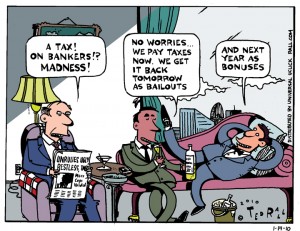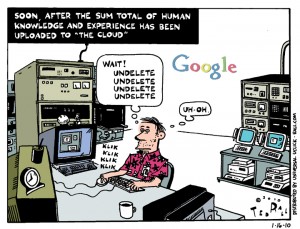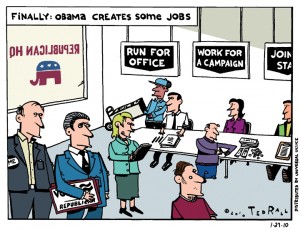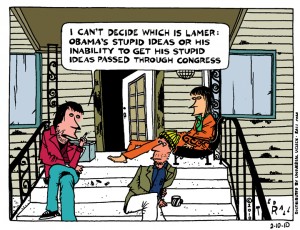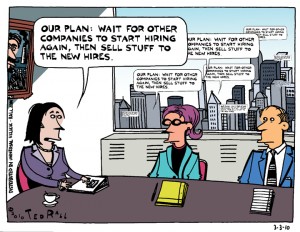Animated editorial cartoon by Ted Rall and David Essman. This is the pilot “webisode” of a new series about downward mobility in America.
SYNDICATED COLUMN: Next: Digital Totalitarianism
The Conspiracy to Abolish Cash
For many years figures on the political fringe, especially on the right, have claimed that the government and its corporate owners want to transform us into a cashless society. Their warnings about the conspiracy against paper money fell on deaf ears, primarily because the digitalization of financial transactions seemed more like the result of organic business trends than the manifestation of some sinister conspiracy.
Now, however, those who want to do away with liquid currency are stepping out of the shadows. They talk about increased efficiency and profit potential, but their real agenda is nothing less than enslavement of the human race.
“Physical currency is a bulky, germ-smeared, carbon-intensive, expensive medium of exchange. Let’s dump it,” argued David Wolman in Wired.
Citing a 2002 study for the Organization for Economic Development that states “money’s destiny is to become digital, ” a Defense Department-affiliated economics professor has authored an Op/Ed for The New York Times that asks: “Why not eliminate the use of physical cash worldwide?” Jonathan Lipow urges President Obama to “push for an international agreement to eliminate the largest-denomination bills” and urges the replacement of bills and coins by “smart cards with biometric security features.”
Lipow’s justification for calling for the most radical change to the fundamental nature of commerce since industrialization is, of all things, fighting terrorism. “In a cashless economy, insurgents’ and terrorists’ electronic payments would generate audit trails that could be screened by data mining software; every payment and transfer would yield a treasure trove of information about their agents, their locations and their intentions,” Lipow writes. “This would pose similar challenges for criminals.”
Terrorism is a mere fig leaf. According to the annual “Patterns of Global Terrorism” report compiled by the U.S. State Department, the highest total death toll attributed to terrorism in the last 20 years occurred in—surprise—2001. Including 9/11, only 3,547 people were killed in 346 acts of violence worldwide. Tragic. Obviously. But, in the overall scheme of things, terrorism is not a big deal.
Measured in terms of loss of life and economic disruption, terrorism is a trivial problem, hardly worth mentioning. According to the UN, 36 million people die annually from hunger and malnutrition. Over half a million die in car wrecks—but you don’t hear people like Lipow demanding that we get rid of cars. A more legitimate concern is the “loss” of taxes upon the underground economy, estimated by the IMF at 15 percent of transactions in developed nations.
What the anti-cash movement really wants is digital totalitarianism: a dystopian nightmare in which the entire human race is enslaved by international corporations and their pet governments. An anti-establishment gadfly like WikiLeaks founder Julian Assange could be instantly deprived of money—and thus freedom of movement—with a couple of keystrokes. (We saw a preview of this when PayPal and Amazon shut down WikiLeaks donation mechanism and web server, respectively.) The high-tech hell depicted by the film “Enemy of the State” would become reality.
It is true that, in a society where every good and service has to be paid for with a debit or credit card, terrorist groups would find it much harder to operate. Don’t forget, however, that today’s terrorists often become tomorrow’s liberators. Anti-British terrorists George Washington and Thomas Jefferson wouldn’t have stood a chance if the Brits had been able to intercept wire transfers from France.
Decashification would establish digital totalitarianism, a form of corporo-government control so rigid, thorough and all-encompassing that by comparison it would make Hitler and Stalin look like easygoing surfer dudes. The abolition of unregulated financial transactions would freeze the political configuration of the world, making it impossible for opposition movements—much less revolutionary ones—to challenge the status quo.
A society without dissent has no hope. Even if we lived in a perfect world where everyone was ruled by wildly popular, benevolent, scrupulously honest regimes—ha!—eliminating the slightest possibility of opposition would lead to barbarism.
We’re already more than halfway to a cashless society. In the U.S. few young adults still use checks. In many countries debit and credit card transactions now exceed those made via cash and checks combined. In 2007 the chairman of Visa Europe predicted the abolition of cash by 2012. Obviously he was wrong. But that’s where we’re headed. The U.K. plans to abolish checking accounts by 2018.
Even if you love your government, don’t want it to change, and think political opponents belong in prison, you ought to worry. As things currently stand, we know the big banks can’t be trusted. Remember when they introduced ATM cards? Banks wanted us to use them so they could lay off tellers. Then they instituted “convenience fees.” Which they have raised, and raised, to the point that taking $20 out of an out-of-town ATM could cost you $5 in fees ($2 for their bank, $3 for yours).
Imagine what your life will look like under digital totalitarianism. Your pay is direct-deposited into your bank account. You’ll pay for small purchases with your cellphone; if you owe a few bucks to a friend you’ll be able to bump your phone against your friend’s to settle up. Nowadays, some corporations allow you to control when your bills get deducted; in the future they’ll demand that you authorize them to do it automatically. What if you have a disputed charge? They’ll already have your dollars, or work credits, or whatever they’ll call them. Good luck trying to get it back from the Indian call-center guy.
As corporate ownership becomes increasingly monopolized and intertwined, your overdue phone bill might be owned by the same outfit as your bank, which would simply take what it says you owe.
The law of unintended consequences is getting a serious workout thanks to digitalization. Motorists in New York were thrilled when the EZPass system allowed them to breeze past lines at toll bridges—at a discount, no less. Then divorce lawyers began subpoenaing EZPass records to prove that a spouse was cheating. Next police set up EZPass scanners on the bridges; if you pass two of them too fast, a speeding ticket is automatically generated. The next step is to eliminate cash lanes entirely; non-EZPass tag holders will soon have their license plates scanned and receive a bill by mail—plus a $2 to $3 “handling” fee.
Think there are too many fees now? If you think you can’t trust banks now, imagine how badly they’ll gouge you when they control every single commercial transaction down to the purchase of a pack of gum. Angry about taxes? When tax agencies can take the money out of your account without asking, they will. Unlike cash, that phone bump to pay your friend will be a trackable, data mineable, fully taxable commercial transaction.
As if the post-2008 economic collapse hadn’t proven that no one is looking out for We the People but ourselves—and then barely so—the digivangelists tell us not to worry, that Big Brother, Inc. will smooth out the rough patches on the road to techno-fascist domination. From Wolman in Wired: “Opponents used to argue that killing cash would hurt low-income workers—for instance, by eliminating cash tips. But a modest increase in the minimum wage would offset that loss; government savings from not printing money could go toward lower taxes for employers.” Sure. The same way banks passed on the savings they earned by replacing tellers with ATMs to their customers.
Americans are skipping into the digital inferno wearing a smile and relishing the smell of their own burning flesh. Countless friends and acquaintances pay all their bills online. “I’m all about using my checking account in place of cash and would love to be able to eliminate cash entirely from my life,” gushed PCWorld’s Tony Bradley recently.
“Give me convenience or give me death” was the title of an album by the punk band Dead Kennedys.
We’ll get both.
(Ted Rall is the author of “The Anti-American Manifesto.” His website is tedrall.com.)
COPYRIGHT 2010 TED RALL
Ted Rall’s Holiday Wishlist
Since some of my ridiculously kind readers have asked, here is my Amazon wish list. Happy Holidays!
Ted Rall’s Best Cartoons of 2010
Every year, Newsweek and other
publications publish their “Best Cartoons of the Year.” Of course,
these are usually some of the worst cartoons ever–including
whichever ones of mine they pick. This year, I’m offering my own
selection of my favorite cartoons by yours truly. This is also a
homework assignment. I’m putting together entries for the Pulitzer
and other contests for cartooning. If you particularly like or
dislike one of the following cartoons, please share your comments
about which one(s) and why. Thanks, and happy holidays!
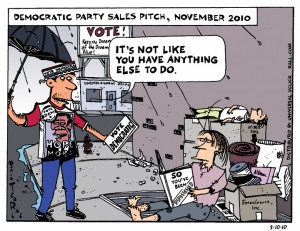
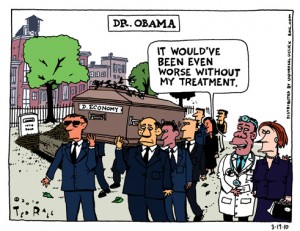
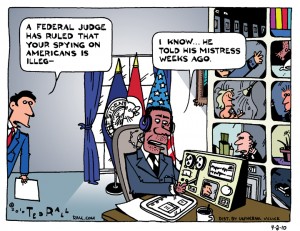

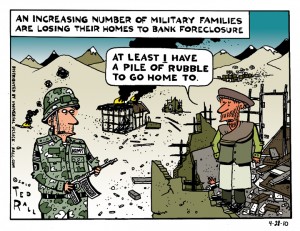
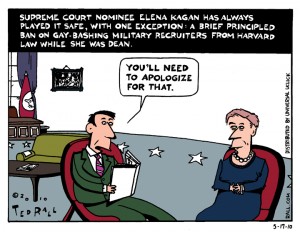

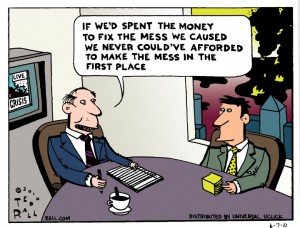
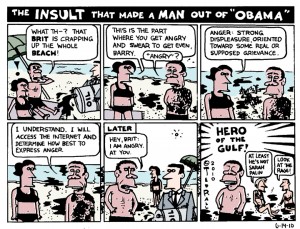
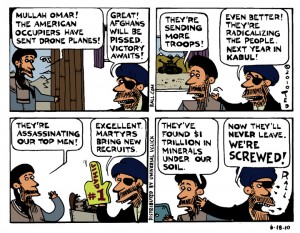


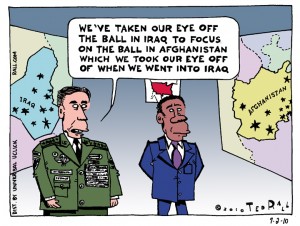

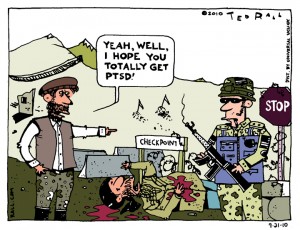
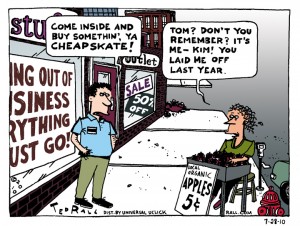

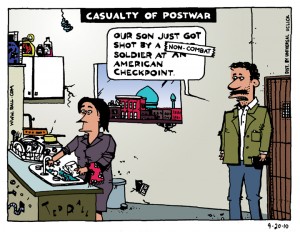
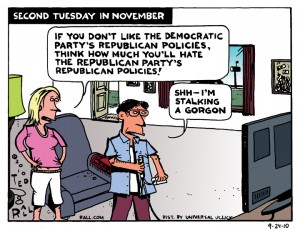
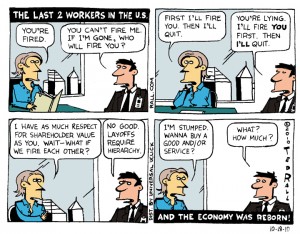


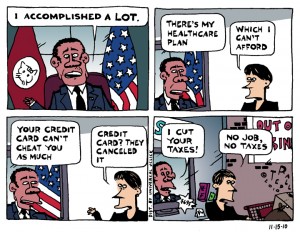
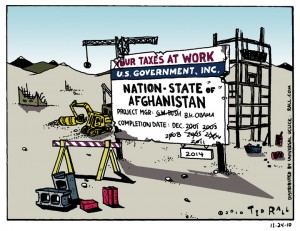
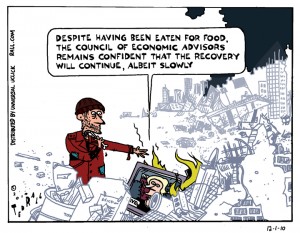

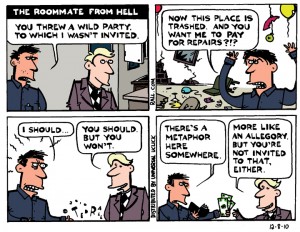
The Future of Political Cartoons
The Future of Political Cartoons
by Rob Tornoe
Editor & Publisher Magazine
December 22, 2010
SYNDICATED COLUMN: The War of Christmas
Time to Take Religion Out of the Calendar
We are a secular nation. We enjoy the constitutional right to exercise any religion—or none whatsoever. So why is Christmas a federal holiday?
The U.S. has no national religion. Yet Christians get special consideration. Aside from Christmas, they also get the quasi-Christian holiday of Thanksgiving. Financial markets are closed on both of those, plus Good Friday.
Devotees of other faiths must ask their employers for time off. Jews aren’t supposed to work on Rosh Hashanah, Yom Kippur, the first and second days of Sukkot, Shemini Atzeret, Simchat Torah, Shavu’ot, or the first, second, seventh and eighth days of Passover. They have to take up to 13 days off from work each year, more than most employers offer.
The message to Jews and other non-Christians is plain: you are second-class citizens. Separation of church and state is a fraud. You wanna practice your faith? Do it on your own time.
You might think that the government’s official embrace of Christmas is a cultural relic of America’s puritan past. But you’d be mistaken. For nearly 100 years, Christmas was not on the calendar of federal holidays. On December 25, 1789, the first Christmas under the new U.S. constitution, Congress was in session. Ulysses Grant made it a federal holiday in 1870.
At first (and second and third) glance, the Christmas federal holiday seems like a clear violation of the Establishment Clause of the U.S. Constitution. In 1999, however, a federal district court judge in Ohio rejected a lawsuit challenging the special status of Christmas. The court ruled that “the establishment of Christmas Day as a legal public holiday does…not have the effect of endorsing religion in general or Christianity in particular.”
Legal reasoning gave way to the simplest calculus: we do stuff because we can.
Right-wing commentators such as Bill O’Reilly have accused liberals of waging a “war on Christmas.” Actually, there’s a war of Christmas: Christians use the holiday as a bludgeon against the rest of us. (Sort of how the “war on terrorism” is really a “war of terror.”) Christmas’ designation as a federal holiday is the most brazen and thus most offensive manifestation of Christian hegemony in America.
The Christian Right’s “war on Christmas” meme would be laughable if it didn’t work; they’re the majority, they’re in charge, but somehow they’re victims. The smallest concession to common decency and sensitivity—e.g. not displaying nativity scenes on government property—is portrayed as an attack on innocent Christians. Not subtle. But clever: the dominant majority gets to claim victimhood. Anything short than total domination isn’t good enough.
This has nothing to do with suppressing Christianity. I am touched, not offended, when a person of faith says that he or she is praying for me, or wishes me a “Merry Christmas.” Individual and/or private displays of religiosity are fine.
Official expressions of a specific religion, however, are disgusting and inherently repressive. Public-school teachers should not wish their students a Merry Christmas. Presidents should not end speeches by saying “God Bless America.” Our currency should not read “In God We Trust.” Courts should not use Bibles to swear in witnesses. Government officials and employees who wear their Christianity on their sleeves reinforce the majority and subjugate the minority. Notice, it’s always Christians. When’s the last time a TSA screener wished you a blessed Ramadan?
A country should live up to its stated principles. Everyone who wants to honor Christmas, whether in its religious or its consumerist contexts, is free to do so. Go to midnight mass. Festoon your roof with plastic Santas. But the government shouldn’t make it easier on Christians to celebrate one of their religious holidays than it does members of other faiths.
There are only two fair courses of action:
First, remove Christmas from the list of federal holidays. But replace it with something secular! Preferably in March or April. There’s a long gap there.
Alternatively, add holidays for other religions. Of course, this could get complicated. How many holidays for each religion? Some faiths are more festive than others. How far down the list of major American religions do we go? The Zoroastrian holiday of Navruz? Shall we make room for new religions like Scientology?
After every sect gets its day in court there might not be a single day left in the year to work.
I say: the more days off, the merrier. Er, better.
(Ted Rall is the author of “The Anti-American Manifesto.” His website is tedrall.com.)
COPYRIGHT 2010 TED RALL
SYNDICATED COLUMN: The Death of the Moderates
Extreme Problems Require Extreme Solutions
Given his druthers, Obama will pursue the most left-leaning course that he can get away with.” So says Jennifer Rubin, a right-wing pundit at the neoconservative-leaning Washington Post. “Obama,” Rubin claims, “would have marched through his entire liberal agenda—if he had the votes.”
This, of course, assumes that Obama ever had a liberal agenda. There’s not much evidence of that. Moreover, Obama did have the votes in Congress to get almost everything that he wanted. But he chose not to even try.
It is also not true. He did have the votes. In recent years, for example, minority Republicans in the Senate have threatened filibusters on most major Democratic initiatives. When they have 60 or more votes, Democrats file a cloture motion to stop filibusters before they start. In practice, Democrats say—and the media has been repeating their meme—that it now takes 60 votes to pass a bill in the Senate.
It isn’t true. Not now. Not ever.
What Dems fail to understand is that they are depriving themselves of a big political opportunity by embracing automated parliamentary procedure. If Republicans want to filibuster, let them drag out their District of Columbia white pages and start reading on C-Span. Footage of GOP senators stonewalling popular legislation—extensions of unemployment benefits, eliminating tax breaks for individuals who earn more than $1 million a year, or healthcare benefits for 9/11 first responders—would make for awesome attack ads in 2012.
When the Bush Administration enjoyed a razor-thin 50-vote majority in the Senate, it only needed a simple majority in order to pass major bills. Even though they should have, Democrats didn’t filibuster. Democrats lack nerve. And voters hate them for it.
There’s another factor at work: self-delusion. Much liberal disappointment with Obama stems from the fact that, on several issues, he is doing exactly what he said he was going to do during the campaign. He told us that we were going to go deeper in Afghanistan. Liberals simply chose to pretend that he was lying. It’s not Obama’s fault if people are in denial. At the same time, Obama failed to realize that the world had changed dramatically between September and November of 2008.
During the summer of the 2008 campaign, there was a plausible argument to be made that the American people were fundamentally moderate. But after the economic meltdown of September 2008, a crisis of capitalism and consumer confidence that continues today with no end in sight, the electorate moved decidedly to the left. Six months into Obama’s term, most Americans told pollsters they preferred socialism to capitalism. In early 2010 one in five Republicans said they have a positive view of socialism.
Meanwhile, the right became more radical too. This is what happens during a crisis when the “mainstream” system is unresponsive. Moderation? There are no more moderates.
As we have seen time and time again in American history, compromises usually mean no solution at all. From the status of Missouri as a slave state to last week’s tax deal between Democrats and Republicans, compromise usually means kicking the can down the road for another generation of people and politicians to contend with.
Yet the myth persists: moderation equals common sense. I don’t know about my fellow lefties, but I find more common ground with Tea Party types who are angry as hell and don’t want to take it anymore than I do with squishy soft liberals who think everything is fine as long as Barack Obama gets reelected in 2012.
Nothing is fine. The unemployment rate is over 9.8 percent officially and about 20 percent unofficially. Yet neither party has lifted a finger to even talk about proposing a jobs program. Tax cuts? Unemployed people don’t pay taxes. Depression-level joblessness is fiscal poison. If we don’t create tens of millions of new jobs soon, social and political unrest will increase dramatically.
Chris Hedges recently put out a book titled “The Death of the Liberal Class.” A better title might have been “The Death of Moderation.” No one better embodied the American brand of political moderation than traditional liberals. They supported income redistribution, but only through a slightly progressive income tax: not enough to make a difference, but plenty to make right-wingers spitting mad. They consistently voted for huge defense budgets and war after war, yet were successfully framed as wimps by Republicans whose rhetoric matched their similar bellicosity.
The smug and the complacent love moderation precisely because it can’t change the status quo.
Look at ObamaCare: that’s what happens when you compromise. The insurance companies get to soak even more Americans than usual—and charge those of us who are already in the system more. Like many other issues, the “extremes” work better than the centrist, “common sense” solution. If I can’t have full-fledged socialized medicine, give me free markets.
Moderates know their time has past. New York Mayor Michael Bloomberg recently brought 1,000 people together to create a militant moderate organization called No Labels. Like Jon Stewart’s Million Moderate March, No Labels is meant “not to create a new party, but to forge a third way within the existing parties, one that permits debate on issues in an atmosphere of civility and mutual respect,” say organizers.
Sweet.
Because, you know, you should always be civil and respectful to people who think torture and concentration camps are A-OK.
For those who despair of the rise of political extremism, I ask: From multi-trillion dollar deficits to endless war to mass die-offs of species and climate change, are the problems America face so trivial that they can be resolved with more half-assed compromises?
(Ted Rall is the author of “The Anti-American Manifesto.” His website is tedrall.com.)
COPYRIGHT 2010 TED RALL
Video: Ted Rall on “The Anti-American Manifesto”
Video: Ted Rall on “The Anti-American Manifesto”
University of Michigan Library
December 12, 2010
Reluctant Revolutionary: Ted Rall
Reluctant Revolutionary: Ted Rall
CUNY Graduate Center Advocate
December 8, 2010



